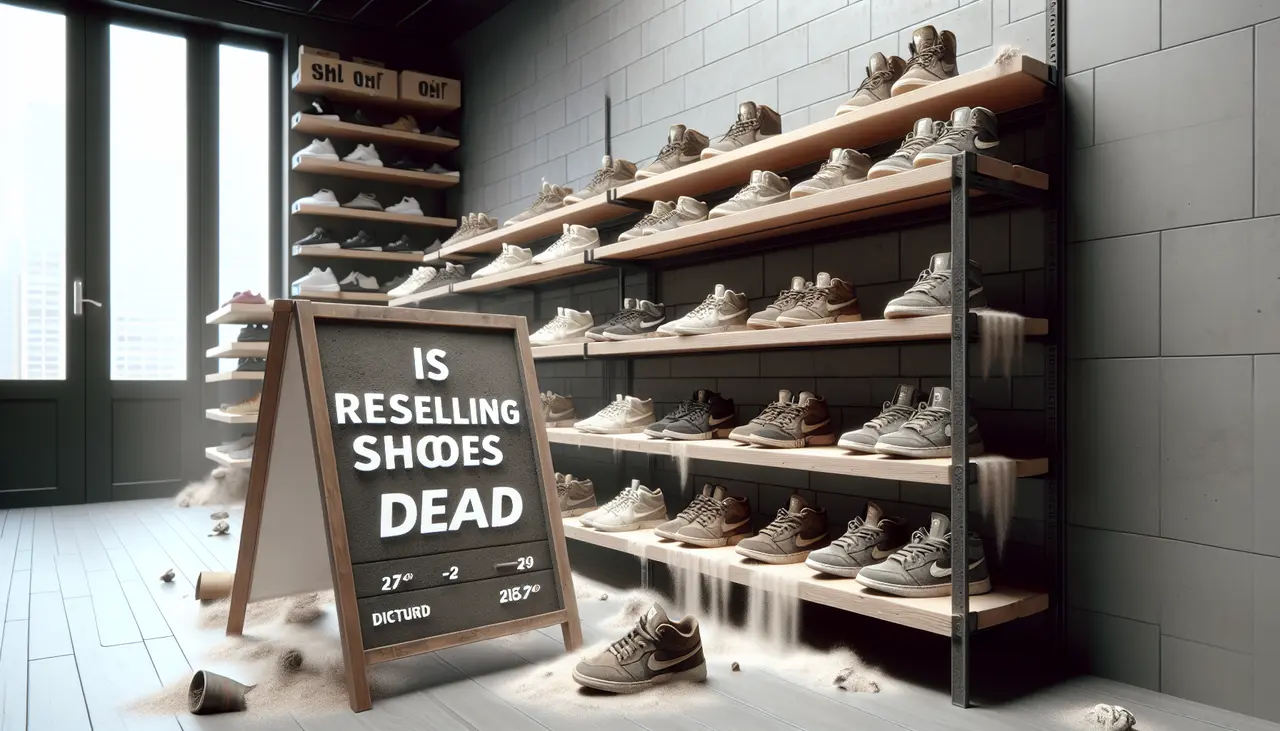is reselling shoes dead
Introduction to the Reselling Shoes Debate
The debate on whether reselling shoes is dead might stir up heated conversations in certain circles. Let’s cut to the chase. The market for reselling sneakers has exploded over the past decade, thanks to a surge in sneaker culture and the rise of platforms dedicated to the trade. Some argue that the golden age of shoe flipping is over, hindered by oversaturation and increased competition. Yet, others maintain that with the right strategy and knowledge, flipping sneakers can still be a lucrative hustle. The truth? It’s not black and white. Factors such as which brands you’re dealing with, the rarity of the models, and how well you understand the market’s demand play massive roles. In essence, while the landscape has indeed shifted, declaring reselling shoes as dead might be premature. Let’s dive deeper into what’s changed and what it takes to succeed in today’s sneaker reselling game.
The Rise of the Sneaker Resell Market
The sneaker resell market isn’t new, but it’s changed a lot over the years. Once a small scene for hardcore sneakerheads, it’s now a booming industry. Big names like Nike and Adidas drop limited-edition sneakers that sell out in seconds. This shortage and high demand drive the market. The internet, especially social media, has fueled this growth. Platforms like Instagram and Facebook are where sellers show off kicks and connect with buyers. Sites like StockX and GOAT provide a safe place to buy and sell. Sneaker reselling is now a viable way to make money, with some people even turning it into a full-time job. The industry’s rise isn’t slowing down, proving that the hustle is very much alive and kicking.
Factors Impacting the Current State of Shoe Reselling
The shoe reselling game has changed a lot, but it’s far from dead. To get it right, understanding what factors impact the scene is key. First off, the brand and rarity of the shoe play a huge role. High-demand, limited releases from brands like Nike or Adidas, especially their collaborations, can sell for way more than their retail price. Supply and demand, baby. Next, the condition of the shoe is crucial. Deadstock, or shoes that are brand new and never worn, fetch the highest prices. Worn shoes can still sell, but they won’t bring in as much money. The platform you choose to sell on also makes a difference. Places like eBay, StockX, and local sneaker conventions have their own vibes and rules. Finally, how well you can predict trends and time your sales can turn you from a hobbyist into a pro. People who treat it like a business, staying ahead of release dates and hype, tend to do better. Sure, the game’s tougher and more competitive, but with the right approach, it’s still very much alive.
How the Digital Age has Changed Reselling
The digital age has turned the shoe reselling game on its head. Back in the day, snagging a rare pair meant camping outside stores or having the right connections. Now, apps like StockX and GOAT put the entire market in your palm. Here’s the thing: everyone can see what everyone else is charging, leading to fierce competition and thinner margins. Plus, social media platforms like Instagram and Twitter have become battlegrounds where hype builds and deals are made. Even big brands have caught on, dropping limited releases through their apps, making it harder for resellers to corner the market. Despite these changes, the hustle hasn’t died; it’s evolved. Now, success in reselling shoes demands more than just showing up; it requires savvy digital strategies and an understanding of the online marketplace.
The Role of Limited Edition Releases in Reselling Viability
Limited edition releases are like gold in the shoe reselling world. Brands drop a small number of shoes, creating a frenzy among collectors and fans. This scarcity drives prices up in the resale market because suddenly, everyone wants what there’s not much of. Think of it this way: when a brand releases a shoe that you can only find in select places and in limited quantities, it becomes more than just a shoe. It turns into a rare find, a must-have. And that’s where resellers come in. They buy these limited drops, knowing well that the demand will outstrip the supply, allowing them to sell at a higher price. This tactic isn’t new, but it’s proven. The key? Stay informed. Know when and where these limited drops will happen and be quick to act. Remember, the allure of owning something exclusive never fades, and as long as brands continue to release limited edition shoes, reselling isn’t going anywhere.
Challenges Facing Today’s Shoe Resellers
The shoe reselling game has changed, and not everyone is winning. First off, the market’s flooded. With more people jumping in to flip sneakers, the competition is tougher than ever. Then there’s the bots. These automated programs snatch up limited releases in seconds, leaving manual buyers in the dust. And let’s not forget about the fakes. High-quality counterfeits are everywhere, making it harder for buyers to trust resellers. Pair this with the rising costs of sought-after sneakers and shipping fees, and you’ve got a tough scene. It’s not just about finding a rare pair anymore; it’s about outsmarting bots, standing out in a crowded market, and keeping your reputation spotless.
Success Stories in the Resell Market: Still Possible?
The shoe resell market is tough, but tales of success tell us it’s not dead yet. People out there are making a solid profit. Take for example sneakerheads who hit jackpot scoring limited edition drops and flipping them for double, sometimes triple the price. It’s all about strategy – knowing which releases will be in high demand, when to sell, and how to reach the right buyers. Some folks have turned this hustle into their full-time gig, thanks to platforms like eBay, StockX, and GOAT. It’s not just about having the capital to start but also about having the insight on market trends and consumer behavior. So, yes, making money by reselling shoes is still very much possible if you play your cards right.
Strategies for Staying Profitable in Shoe Reselling
The game has changed, but it’s not over. To stay profitable in shoe reselling, you need to adapt. First, understand the market. Know which shoe models and brands are in demand. Limited edition releases and collaborations between brands and artists or athletes still bring high returns. Use social media to your advantage. Platforms like Instagram and Twitter can be powerful tools for gauging trends and marketing your sneakers. Build relationships with customers and provide exceptional service to encourage repeat business. Also, diversify your inventory. Don’t put all your eggs in one basket by only stocking hyped shoes; include some under-the-radar models that have potential to grow in value. Lastly, be smart about your pricing. Set competitive yet profitable prices by staying informed about market values. Yes, reselling shoes has more players now, but by playing your cards right, you can still come out on top.
The Future Outlook for the Resell Market
Many think the golden days of reselling shoes are behind us. But let’s get real – the market is simply evolving, not dying. Demand for limited edition and hype sneakers hasn’t vanished; it’s just that the game has changed. Technology and a surge in savvy resellers have made finding deals and flipping sneakers more competitive. Brands are also getting smarter about releases, using apps and raffles to create a fairer shot for everyone. However, this also means resellers need to up their game. Adaptation and strategy are the new keys. Staying informed about release dates, understanding market trends, and building a solid network are crucial. The future of the shoe resell market still shines bright for those willing to put in the work. It’s all about staying one step ahead, both literally and figuratively.
Conclusion: Is Reselling Shoes Truly Dead?
In wrapping up, is the shoe resale game done for? Not even close. The market has indeed faced hiccups, with more people jumping on the bandwagon and brands releasing more products. However, this doesn’t spell the end. It shifts the game. Resellers need to adapt, focusing more on rare finds and building a loyal customer base. Demand for exclusive and limited-edition sneakers isn’t going away. So, for those willing to put in the effort, research, and adapt their strategies, there are still profits to be made. The key is in staying ahead of the trends and understanding the market dynamics. In essence, reselling shoes isn’t dead; it’s evolving.




